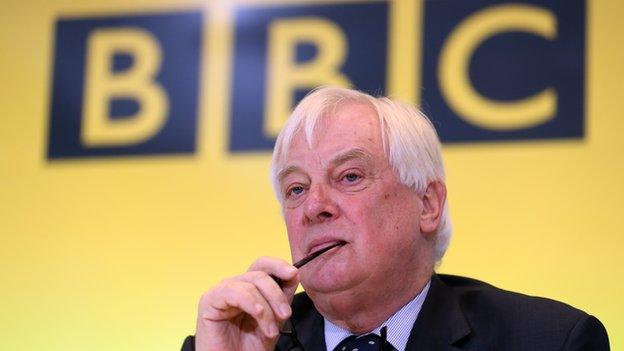Lord Patten: BBC to tackle 'toxic' pay issue
- Published
Lord Patten: "The biggest issue for the public is senior executive pay"
BBC Trust chairman Lord Patten has said moves will be announced in the next few days to tackle the issue of salaries paid to executives at the corporation.
Speaking on The Andrew Marr Show, he said it is "one of the most toxic reasons for the public's lack of sympathy for the BBC".
He said pay of top bosses and staff on £150,000 or more would be addressed.
Lord Patten added that closing a service to deal with funding cuts had not been ruled out.
The peer, who took up his post in May, heads the body which oversees the workings of the BBC on behalf of licence fee payers.
An ongoing review which is looking at ways to save money at the BBC included "looking at the main relationships between the TV channels", he said.
"I think we can see symmetries that we can perhaps organise better."
But Lord Patten added that the review is "looking at everything" and any proposals are unlikely to be firmed up until at least September.
'Fairness'
Speaking about the issue of executive pay, the BBC Trust chairman said he hoped the corporation could become the first organisation to implement some of Will Hutton's proposals for fair pay, external published in March.
Among Mr Hutton's ideas is that an executive would not receive pay of more than 20 times the median salary of an organisation.
Last year he was asked to lead a review of public sector pay and examine the disparities between those on the highest salaries and workers who are paid the least.
Lord Patten also said there was an issue of "fairness across the board" to be addressed, with some staff benefits only applicable to senior managers.
Measures to curb pay have already been taken, including a freeze on executive pay, cuts from the top 25% of the wage bill, while the BBC executive board surrendered a month's pay both this year and in 2010.
The corporation is facing cuts of 17-20% after after the licence fee was frozen for six years and the costs of the World Service were transferred to the BBC.
Lord Patten said that he wants the BBC to become "flexible, lean, more confident and self-challenging", adding that it would have to "learn to live with a flat budget".
But he said the broadcaster would still be capable of delivering high quality programming.
The former Conservative cabinet minister also praised BBC Three for two recent documentaries, calling them "brilliant programmes".
The digital channel has been criticised previously for some of its content.
- Published3 July 2011
- Published6 May 2014

- Published12 June 2011
- Published5 May 2011